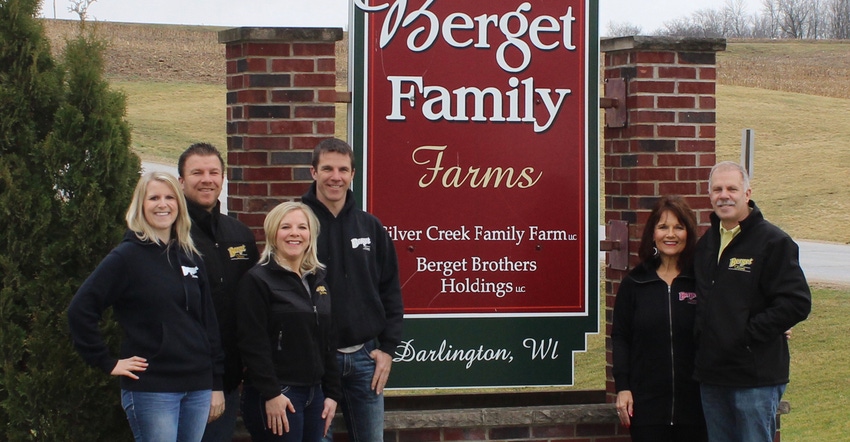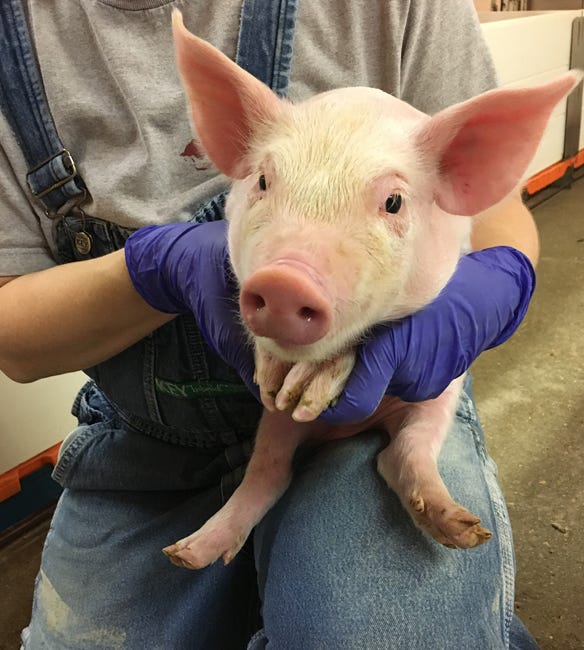July 11, 2017

It’s “pretty much a family operation,” says Mike Berget of the various enterprises he manages in the Darlington area.
He and his wife, Judy; their daughters, Christina Meylor and Meghan Saunders; and their sons, Matt and Scott Berget, farm separately but together. As a whole, they oversee 11,000 acres of crops, care for nearly 1,500 sows, farrow and wean some 48,000 pigs each year, and operate transportation companies.
Mike and his sons own and rent about 3,300 acres each, and Meghan rents another 1,100.
Shared responsibilities
“We share the machinery and own it together,” Mike explains. They also share responsibilities. Mike is the overall manager, and Judy does the bookkeeping. Christina, who also farms separately with her husband, Bart Meylor, supervises and handles human resources in the contract hog-farrowing operation. Scott is in charge of the grain trucking business, operating the grain facility and marketing. Matt works with machinery maintenance and crops. Meghan is secretary of the grain operation and manages human resources. Outside of the hog facilities, the various enterprises employ four full-time workers and seven or eight part-timers.
Christina has six full-time employees who work with the sows and farrowing. Mike calls it a “breed to wean” business. “We’ve been doing it since 2001. It’s been working real well,” he says.
The sows are owned by Illinois interests. They provide the feed and AI semen, and contract with the Bergets’ Silver Creek Family Farm LLC to do the feeding, breeding and weaning. The purebred large white sows are artificially inseminated by landrace boars. As the offspring are weaned, they’re sent to the Illinois owners for breeding back to terminal boars to produce market hogs.
“We do an awful lot for biosecurity,” Mike points out, citing “the same biosecurity that a boar stud would have.”
He notes with pride a farrowing rate of 28 to 29 pigs per sow per year. Each sow is bred back to produce 2.3 to 2.4 litters per year. “Our guys do a really good job,” he says. “It takes good people and good breeding stock.” A veterinarian visits at least biweekly. The operation weans 750 to 900 pigs each week and breeds 80 to 90 sows.

FEEDER PIGS: The Berget family operates a “breed to wean” hog business. They wean 750 to 900 pigs each week.

The family’s Silver Creek Transportation LLC handles the pig trucking, again with full biosecurity. “Having our own transportation company is a big part of the biosecurity,” Mike says.
Another family trucking company, Berget Farms Inc., provides grain transit. “We may haul up to 100 loads a day” to various markets in the region, including ethanol plants, Mike says. “We’re fortunate to have a lot of good markets.” The family crops under the general, noncorporate title of Berget Farms and is heavily into corn — up to 9,500 acres annually — along with 1,100 acres of soybeans and 400 acres of wheat. Corn-on-corn crops are common for years.
“We have some landlords who want to stay 50-50 corn-to-beans,” Mike notes, but otherwise the family keeps planting corn. Some fields have raised nothing but corn for 20 years.
The family has farms up to 60 miles away, but Mike explains there are probably 18 to 20 other farms in between, so they’re not traveling more than about 4 miles from one farm to the next.
All of their corn ground is fertilized and planted in rows that are shifted 15 inches off the previous year. Their strip-tillage method is a form of no-till.
“There’s no disturbance to the soil until we get ready to plant,” Mike says. “Sixty percent to 70% of the residue [from the previous year] is left on the field. A variable seeding rate is utilized. Fertilizer is applied in thirds: early in spring, with the planting and as the corn reaches about chest-height.” All dry fertilizer is put on in the spring in strips 6 inches wide by 5 inches deep, Mike explains. “It’s not like banding it. It’s stirred into the soil.” Anhydrous ammonia was applied on some fields last fall, 15 inches off the harvested rows. “It’s been working,” Mike says. “We’ve been doing it since 2012.”
High yields
The Bergets average just over 200 bushels of corn per acre. Mike placed third in Wisconsin in the National Corn Growers Association yield contest last fall and is pleased about his recent election to the Wisconsin Corn Growers Association board of directors.
The grain business is run like an elevator. The grain facility consists of a state-approved scale and an 8,000-bushel-per-hour drier. There is wet storage capacity of 110,000 bushels and dry storage for 1.1 million bushels.
The Bergets are charter members of a new farmer-led coalition, Lafayette Ag Stewardship Alliance, which was started last April and is focused on clean water and conservation.
All of their crops are insured with federal crop insurance by S.M.G. Insurance. They use forward contracts. “We pretty much forward-contract whatever we can and put puts on the rest,” Mike explains.
He says the family is always watching for land, not necessarily to expand, but to replace more marginal soil “with good ground.”
They try to rent with three-year arrangements. “If it’s longer, we have to put in some kind of price adjustment,” he says. “I’ve been renting some of my farms for over 20 years. It’s kind of how you treat your landlord. You’ve got to be fair.”
Buchholz lives in Fond du Lac.
About the Author(s)
You May Also Like




